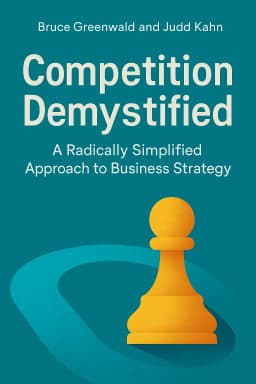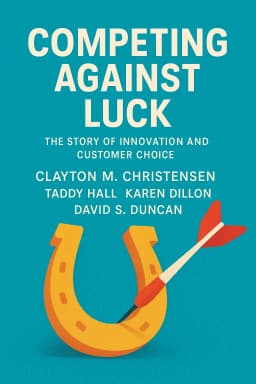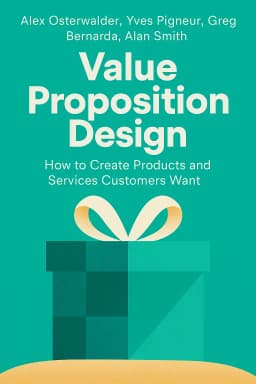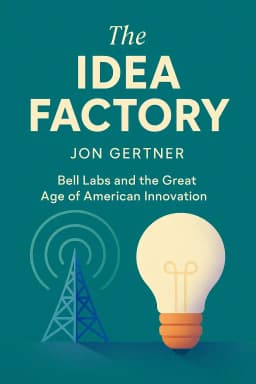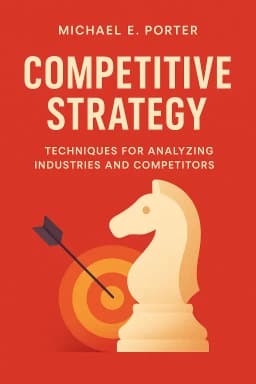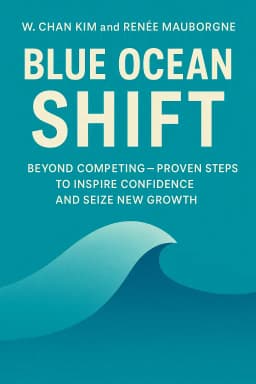
Making Competition Irrelevant
Golden Hook & Introduction
SECTION
Joe: Most business advice is about winning. Beating your rivals, capturing market share, climbing to the top. What if that’s all wrong? What if the secret to explosive growth isn't to fight harder, but to make your competition completely irrelevant? Lewis: Whoa, hold on. Making the competition irrelevant? That sounds like a fantasy. For most of us, competition is the only reality. It defines everything—price, features, marketing. How can you just decide it doesn't matter anymore? Joe: That's the radical premise of the book we're diving into today: Blue Ocean Shift by W. Chan Kim and Renée Mauborgne. It’s a guide to moving from bloody, competitive “red oceans” to wide-open “blue oceans” of new market space. Lewis: Right, and these aren't just any authors. They're the duo behind the global phenomenon Blue Ocean Strategy. This book, Shift, is the practical, battle-tested sequel. I read that they spent over a decade seeing how their ideas succeeded and failed in the real world before writing this step-by-step guide. Joe: Exactly. It's less theory, more 'here's how you actually do it.' And it all starts with a profound change in mindset, a new way of seeing the world. It’s about realizing that the rules of your industry probably aren’t real rules at all. Lewis: Okay, that’s a bold claim. You’re saying the way entire industries have operated for decades is just… a collective hallucination? Joe: In a way, yes. The authors argue that we treat industry conditions as fixed, like gravity. But they’re not. They were created by the actions and decisions of other people, and they can be reshaped. Steve Jobs had a great quote about this. He said life can be much broader once you realize that everything around you was made up by people that were no smarter than you. And you can change it. You can poke it. Lewis: You can poke life. I like that. It’s less about fighting a war and more about being an architect. But where do you even start? It feels like you’d need a massive budget or a stroke of genius. Joe: That’s the common misconception. The starting point isn't money or a lightning bolt of inspiration. It's a shift in perspective. Let me tell you a story that perfectly captures this.
The Blue Ocean Mindset: Reshaping Reality Instead of Competing In It
SECTION
Joe: Let’s go back to the UK in the 1980s. The charity industry was a brutal red ocean. Thousands of organizations were fighting for the same donor pounds. Their main tool? Guilt. Heart-wrenching images, sad music, pleas for pity. It was a race to see who could make the public feel the most miserable. And it was failing. People were experiencing 'donor fatigue'; they were tired and suspicious. Lewis: I know that feeling. You get so many of those appeals that you just become numb to them. It’s a total turn-off. Joe: Exactly. So in 1985, a new charity called Comic Relief enters the scene. Now, if they had a red ocean mindset, they would have asked, "How can we make a sadder ad than Oxfam? How can we out-guilt the competition?" But they didn't. They asked a completely different question. They asked, "What if giving didn't have to feel bad? What if it could be fun?" Lewis: Fun? Charity and fun didn’t exactly go together back then. Joe: They didn't. But Comic Relief created Red Nose Day. The whole concept was "do something funny for money." Instead of targeting wealthy donors with fancy galas, they targeted everyone. Kids, office workers, grandparents. They sold cheap plastic red noses and encouraged people to do silly, sponsored stunts. And they capped it off with a night of television filled with the nation's best comedians. They completely changed the emotional appeal of the industry. Lewis: So they didn't compete in the "pity market" at all. They created a brand-new "entertainment-fundraising market." They made the old way of doing things irrelevant for one day a year. Joe: Precisely. They eliminated the expensive galas and year-round mailings, which lowered their costs. And they created a leap in value by offering fun, community, and entertainment. They achieved both differentiation and low cost. That’s the core of a blue ocean move. They’ve raised over a billion pounds since they started. Lewis: That's a great story for a non-profit, but what about a cutthroat for-profit business? Does this "reshaping reality" idea work when you're up against huge, established competitors who want to crush you? Joe: It does. Let's look at the market for electric French fry makers. In the mid-2000s, this was a dying industry. A red ocean shrinking by 10% a year. The only way to compete was on price. It was a race to the bottom. Lewis: Sounds miserable. A commodity trap. Joe: Totally. The company Groupe SEB was stuck in it. Their team, led by a guy named Christian Grob, could have tried to make a slightly cheaper or slightly faster fryer. Red ocean thinking. Instead, they stepped back and looked at the noncustomers. Why were people not buying fryers? Lewis: Well, I can guess. They’re unhealthy, it’s a mess to clean up, you have to deal with all that hot oil. It’s a hassle. Joe: You nailed it. Those were the pain points. So Groupe SEB redefined the problem. The problem wasn't "how to build a better deep-fryer." The problem was "how to make delicious, healthy, fresh fries at home without the hassle of frying." Lewis: Ah, a totally different question. That opens up new possibilities. Joe: And the answer was the ActiFry. A machine that could make two pounds of crispy fries with just one tablespoon of oil. It wasn't a better fryer; it was a whole new category of appliance. It was healthier, easier, and safer. When it launched, it grew the entire market by 40%. It was so successful that Oprah tweeted, "This machine… actifry has changed my life, And they’re not paying me to say it." The company's stock jumped 5% overnight. Lewis: Wow. And they did that by focusing on the pain points the rest of the industry was just accepting as the cost of doing business. They didn't fight over the existing customers; they created a new wave of them by solving a problem nobody else was even trying to solve. Joe: That's the mindset shift in a nutshell. You stop looking at what your competitors are doing and start looking at the world through the eyes of buyers and, even more importantly, non-buyers. You stop accepting the industry's trade-offs and start looking for ways to break them. Lewis: Okay, I'm sold on the 'why'—the mindset. It’s about being an architect, not a soldier. But the 'how' still feels massive. It's one thing to say 'reshape reality,' but another to actually do it. It still seems like something only a genius or a giant corporation can pull off. It feels… impossible for the rest of us.
The Human-Centered Toolkit: Making the Impossible Possible
SECTION
Joe: I get that. And the authors address this head-on. They use a great analogy. Having the right mindset is like deciding you want to get in shape. That’s a great first step. But just having the desire and showing up at the gym isn't enough. Lewis: Right. You see people like that all the time. They wander around, lift a few random weights, run for ten minutes, and then leave. A month later, they've quit because they see no results. Joe: Exactly. Because they don't have a plan. They don't know which exercises to do, in what order, with how many reps. They lack the practical knowledge. The book argues that making a blue ocean shift is the same. The mindset is crucial, but you also need a process—a set of tools that builds what they call 'creative competence.' Lewis: Creative competence. I like that. It implies that creativity isn't just some magical gift. It’s a skill you can build. Joe: It is. And the process they lay out is built on a foundation of what they call 'humanness.' It's designed to build people's confidence and overcome the natural fear that comes with doing something new. It has three key elements. The first is Atomization. Lewis: Atomization? Like, breaking things down? Joe: Precisely. Instead of tackling a huge, scary challenge like "reinvent our industry," you break it down into small, concrete, manageable steps. For example, the first step isn't "invent a new product." It's "get your team in a room and simply list all the factors your industry currently competes on." Anyone can do that. It's not intimidating. By completing these small steps, the team builds momentum and confidence. The impossible starts to feel possible. Lewis: Okay, that makes sense. It lowers the barrier to entry for creativity. What's the second element? Joe: The second is Firsthand Discovery. The book argues that you can't outsource insight. You can't understand the pain points of an industry from a PowerPoint presentation or a market research report. You have to go out and see it for yourself. Lewis: Seeing is believing. Joe: It truly is. They tell a story about a pharmacy chain's executive team. The CEO asked them why they didn't use their own company's pharmacies. They all had excuses. So he made them follow a sick colleague through the entire process of getting medicine—the frustrating phone call to the doctor, the long wait in the waiting room, the drive to the pharmacy, another wait for the prescription. By the end of the day, they didn't need a report to tell them their industry was full of pain points. They had felt it themselves. Lewis: That's powerful. It moves the problem from an abstract concept on a spreadsheet to a real, human experience. And the third element? Joe: The third is Fair Process. This means that throughout the process, you engage everyone involved, you explain why decisions are being made, and you're clear about the new expectations. When people feel they are part of the process and are being treated with respect, they're far more likely to commit to the outcome, even if it's a radical change. Lewis: So, you break the challenge down into small pieces, you make people see the problem for themselves, and you treat them fairly along the way. It sounds like it’s as much about psychology as it is about strategy. Joe: It is! And when you combine this human-centered process with the blue ocean mindset, you can achieve truly incredible things. And it's not just for selling more gadgets or hotel rooms. Let me tell you the most powerful story from the book, which comes from the epilogue. It’s about how Malaysia used this to tackle a massive societal problem. Lewis: I'm listening. This is where the rubber really meets the road. Joe: In 2010, Malaysia's prisons were overcrowded, expensive, and failing. The recidivism rate—the rate at which former inmates reoffend—was sky-high. The red ocean solution would be to build more prisons, a hugely expensive and ineffective approach. California, for example, has a recidivism rate of around 65%. Lewis: A vicious cycle. More crime, more prisons, more cost, and it doesn't even solve the problem. Joe: Exactly. So, using the blue ocean process, a cross-ministry team in Malaysia challenged the core assumption of the industry. The assumption was: "criminals belong in high-security prisons." They asked, what if that's not true for everyone? They focused on petty criminals, who were the largest part of the prison population. Lewis: They atomized the problem. Instead of 'fix the prison system,' it became 'what's a better way to handle petty criminals?' Joe: You got it. Then, through firsthand discovery, they realized that what these individuals needed wasn't just punishment, but rehabilitation, skills, and a path back into society. So they looked at their existing assets. The military had huge, idle plots of land all over the country. They realized they could convert these into low-security, low-cost rehabilitation centers. Lewis: That is brilliant. They're using an underutilized asset from one government department to solve a problem in another. Breaking down silos. Joe: And they didn't stop there. They brought in other ministries to provide vocational training, family support, and even job-matching services. They created a holistic solution focused on rehabilitation, not just incarceration. They called it the Community Rehabilitation Program, or CRP. Lewis: And the results? Joe: The results are staggering. The CRP centers were 85% cheaper to build and 58% cheaper to run than a conventional prison. And the recidivism rate for the inmates who went through the program? It dropped to less than 1%. Lewis: Hold on. From 65% down to less than 1%? That’s not an incremental improvement. That's a complete transformation. Joe: It's a quantum leap in value for the prisoners, for their families, and for society as a whole, all achieved at a dramatically lower cost to the government. It’s a perfect blue ocean shift, applied to one of the toughest social challenges there is. It shows that this thinking isn't just a corporate tool. It's a human tool for building a better world.
Synthesis & Takeaways
SECTION
Lewis: That CRP story is just incredible. It completely reframes what this book is about. It's not just about business strategy for market share. It's a methodology for solving seemingly impossible problems by changing the questions you ask. Joe: That's the heart of it. The book was a bestseller and highly acclaimed, but some critics pointed out that implementing these shifts can be really hard in bureaucratic organizations. The Malaysia story is a powerful counter-argument. If a national government, with all its silos and red tape, can do it, then it's possible anywhere. Lewis: So it's not about being a genius inventor like Steve Jobs or having the freewheeling culture of a non-profit. It's about having the courage to ask different questions and, crucially, a process that gives ordinary people the confidence to answer them. Joe: Exactly. The book's biggest 'shift' is from seeing strategy as a zero-sum battle to seeing it as an act of creation. And it argues that creation isn't a random, high-risk lottery. It's a systematic process. The real engine of growth, for a company or a country, isn't fighting over a shrinking pie. It's baking a whole new one. And this book gives you the recipe. Lewis: I love that. It makes you wonder... what's the 'red ocean' in your own life or work? What's the one assumption you've never questioned, the one "rule" you've always accepted as fixed? Joe: That's the question we want to leave everyone with. And we'd love to hear your thoughts. What are the red oceans you're swimming in? Find us on our socials and join the conversation. We're always curious to see how these big ideas land with you. Lewis: It’s a powerful lens to look through. A bit daunting, but also incredibly hopeful. Joe: Hopeful is the perfect word for it. It's a roadmap to creating new possibilities.
